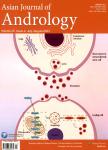Effects of oncological treatments on semen quality in patients with testicular neoplasia or lymphoproliferative disorders
Effects of oncological treatments on semen quality in patients with testicular neoplasia or lymphoproliferative disorders作者机构:Division of Endocrinology Diabetology and Metabolism Unit of Andrology Seminology and Cryopreservation GJ. D. Department of Medical Sciences University of Turin Turin 10126 Italy
出 版 物:《Asian Journal of Andrology》 (亚洲男性学杂志(英文版))
年 卷 期:2013年第15卷第3期
页 面:425-429页
核心收录:
学科分类:0710[理学-生物学] 090502[农学-动物营养与饲料科学] 07[理学] 0905[农学-畜牧学] 071009[理学-细胞生物学] 09[农学] 0901[农学-作物学] 090102[农学-作物遗传育种]
主 题:chemoradiotherapy lymphoproliferative disorders semen analysis semen cryopreservation testicular neoplasia
摘 要:Pretherapy sperm cryopreservation in young men is currently included in good clinical practice guidelines for cancer patients. The aim of this paper is to outline the effects of different oncological treatments on semen quality in patients with testicular neoplasia or lymphoprol iferative disorders, based on an 8-year experience of the Cryopreservation Centre of a large public hospital. Two hundred and sixty-one patients with testicular neoplasia and 219 patients with lymphoproliferative disorders who underwent chemotherapy and/or radiotherapy and pretherapy semen cryopreservation were evaluated. Sperm and hormonal parameters (follicle-stimulating hormone (FSH), luteinizing hormone (LH), testosterone, inhibin B levels) were assessed prior to and 6, 12, 18, 24 and 36 months after the end of cancer treatment. At the time of sperm collection, baseline FSH level and sperm concentration were impaired to a greater extent in patients with malignant testicular neoplasias than in patients with lymphoproliferative disorders. Toxic effects on spermatogenesis were still evident at 6 and 12 months after the end of cancer therapies, while an improvement of seminal parameters was observed after 18 months. In conclusion, an overall increase in sperm concentration was recorded about 18 months after the end of cancer treatments in the majority of patients, even if it was not possible to predict the evolution of each single case 'a priori'. For this reason, pretherapy semen cryopreservation should be considered in all young cancer patients.



